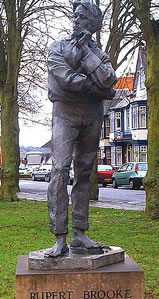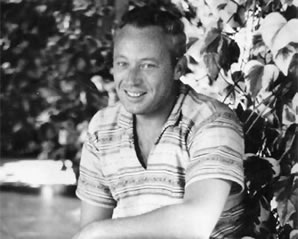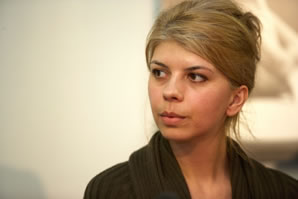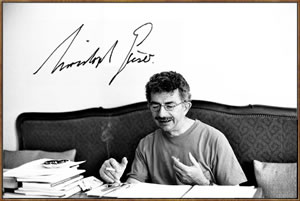De Britse dichter Rupert Brooke werd geboren in Rugby, Engeland, op 3 augustus 1887. Zie ook mijn blog van 3 augustus 2006. en ook mijn blog van 3 augustus 2007 en ook mijn blog van 3 augustus 2008.
Clouds
DOWN the blue night the unending columns press
In noiseless tumult, break and wave and flow,
Now tread the far South, or lift rounds of snow
Up to the white moon’s hidden loveliness.
Some pause in their grave wandering comradeless,
And turn with profound gesture vague and slow,
As who would pray good for the world, but know
Their benediction empty as they bless.
They say that the Dead die not, but remain
Near to the rich heirs of their grief and mirth.
I think they ride the calm mid-heaven, as these,
In wise majestic melancholy train,
And watch the moon, and the still-raging seas,
And men, coming and going on the earth.
Heaven
FISH (fly-replete, in depth of June,
Dawdling away their wat’ry noon)
Ponder deep wisdom, dark or clear,
Each secret fishy hope or fear.
Fish
say, they have their Stream and Pond;
But is there anything Beyond?
This life cannot be All, they swear,
For how unpleasant, if it were!
One may not doubt that, somehow, Good
Shall come of Water and of Mud;
And, sure, the reverent eye must see
A Purpose in Liquidity.
We darkly know, by Faith we cry,
The future is not Wholly Dry.
Mud unto mud! — Death eddies near —
Not here the appointed End, not here!
But somewhere, beyond Space and Time.
Is wetter water, slimier slime!
And there (they trust) there swimmeth One
Who swam ere rivers were begun,
Immense, of fishy form and mind,
Squamous, omnipotent, and kind;
And under that Almighty Fin,
The littlest fish may enter in.
Oh! never fly conceals a hook,
Fish say, in the Eternal Brook,
But more than mundane weeds are there,
And mud, celestially fair;
Fat caterpillars drift around,
And Paradisal grubs are found;
Unfading moths, immortal flies,
And the worm that never dies.
And in that Heaven of all their wish,
There shall be no more land, say fish.

Rupert Brooke (3 augustus 1887 – 23 april 1915)
Standbeeld in Rugby
De Amerikaanse schrijver Leon Uris werd geboren in Baltimore op 3 augustus 1924. Zie ook mijn blog van 3 augustus 2007 en ook mijn blog van 3 augustus 2008.
Uit: O’Hara’s Choice
“The Royal Society of Paddy O’Hara’s Wart-Hogs were the ugliest and most vile men to ever wear the uniform of United States Marines. They were molded out of old, stiff, cracked leather.
The Wart-Hogs were an exclusive brotherhood with no pro-vision at inception for perpetuation. There were about eighteen charter members, no one knew the exact number, all men whose lives had been saved in battle through the gallantry of Paddy O’Hara in three, maybe four, separate Civil War actions.
For many years after the War, all who could gathered for an annual donnybrook. As time moved on, many of the reunions took place at graveside and the society grew more exclusive. But no Wart-Hog ever died in the poorhouse. They were bound by the most powerful of all ties, that of men and their comrades in a war.
The Wart-Hog doors were always open to other Wart-Hogs, but they were scattered and burdened with family life and other traumas, so that meetings became occasional and by chance. Only three remained in the Corps. However, it appeared that the rendezvous at Prichard’s was by design. Prichard’s Inn & Tavern stood on the Post Road in Virginia, across the Potomac from Washington, a most convenient watering hole.
Master Gunnery Sergeant Wally Kunkle was first to arrive by horseback from Quantico down the pike. The Corps had a piece of land there and had established a small, convenient station near the Capitol, where they formed up new units, or housed an overflow from Washington. Quantico had become a nice rest spot and transit center.
Master Gunnery Sergeant Kunkle had been on sea duty and a member of the contingent that ran the Germans out of Samoa. Kunkle had not been home in three years. Well, he actually didn’t have a home.
The Gunny wore his forty-odd years well and he cut quite the figure as he rode up to the inn at Prichard’s. When the stable boy had seen to the horse’s comfort, he came to the Gunny’s room and poured buckets of hot water over him in a big galvanized tub to wash away the road dust. Kunkle then repaired to the common room with the large fireplace in the pub and allowed himself to be overtaken by nostalgia.“

Leon Uris (3 augustus 1924 – 21 juni 2003)
De Duitse dichteres en schrijfster Marica Bodrožić werd geboren op 3 augustus 1973 in Zadvarje in het toenmalige Joegoslavië, tegenwoordig in Kroatië. Toen haar tiende werd zij door haar grootvader opgevoed. Pas in 1983 trok zij naar haar ouders die al in Duitsland werkten als gastarbeiders. Toen pas leerde zij de Duitse taal. Zij studeerde in Frankfurt am Main culturele antropologie, psychoanalyse en slavistiek. In 2002 ontving zij voor haar literaire debuut, de roman Tito ist tot de Heimito-von-Doderer-Preis. In 2007 verscheen het autobiografische boek Sterne erben, Sterne färben. Marica Bodrožić werkt ook als vertaalster. Tegenwoordig woont zij als zelfstandig schrijfster in Berlijn.
Uit: Ein Kolibri kam unverwandelt
„Es gibt ein gutes Zauberbuch, das hat keine Regeln, es wundert sich, es macht, was es machen will, und ist immer im Werden. Es hat keine Gesetze in sich, jede Seite ist eine Zahl, niemand kann es wenden, es ist ein Mittagsmahl. An ihm sich satt zu essen, das ist eine gute Tat. Niemand kann es missen, niemand, der Augen hat. In den weiten Fluren, den Beständen des Morgentaus, ruht ein Wipfel Traum und ruht sich blindlings aus. Einer kommt vorbei, wie auf einer Wanderung, pflückt sich einen Blumenstrauß aus unbewiesener Erinnerung. Da sagt ein Wächter immergrün, es werde richtig Tag.
Im Gelände der Dämmerung, nimmt mich eine große Helle an die schöne Hand. Die Seiten des Buches wenden sich, von allein von still von stumm, das Wundern nimmt sich aus, ein Däumling drumherum. Da wohnt er still und leise, sagt kein Wort von sich, ihn weich umarmend bemerke ich den Vater, wie er, sitzend unterm Maulbeerbaum, seine Augen bricht. Die Sonne weist ihn ein in die Vorhöfe seiner Bilder und mir scheint, ihn dort wissend, er zähle seine Kinder. An den Fingern sieht er menschengleich hinunter; er sieht die Raupen über ihm und ich eile herbei. Ich sage, Vater bleib, das Buch ist für uns zwei.“

Marica Bodrožić (Zadvarje, 3 augustus 1973)
De Pools-Oostenrijkse schrijver Radek Knapp werd geboren op 3 augustus 1964 in Warschau. Zie ook mijn blog van 3 augustus 2007 en ook mijn blog van 3 augustus 2008.
Uit: Herrn Kukas Empfehlungen
„Auch wenn seine Eltern nicht damit einverstanden sind – Waldemar ist fest entschlossen, über den Sommer in den Westen zu gehen. Warschau kann doch nicht alles gewesen sein! Außerdem kann ihm doch nichts passieren – hat er sich doch von Herrn Kuka gegen eine Flasche Wodka ganz
entscheidende Tipps geholt.
So ausgerüstet, kann ihm nichts mehr passieren. Eigentlich wollte er zwar nach Deutschland, doch in Deutschland, so hatte Herr Kuka ihm erklärt, wären die Polen nicht gerne gesehen. Österreich, Wien – das wäre der rechte Platz für ihn.
Der Bus, mit dem Waldemar auf Anraten Herrn Kukas reist, entpuppt sich als umgedrehter Kühlschrank; alle anderen Fahrgäste, merkt er, schmuggeln wie wild. Nur er nicht. Trotzdem geht es an der Grenze beinahe schief, weil der Zöllner ihm nicht glauben will, dass er nicht als Tourist einreisen will.
Doch in Wien angelangt, merkt er schnell: Herrn Kukas Empfehlungen sind höchst zweifelhaft. Der Tipp mit dem billigen Hotelzimmer im Hotel Vier Jahreszeiten entpuppt sich als Parkbank im Belvedere; und dass ein Lippizaner keine Süßspeise ist, muss er auch erst lernen.
Nach einer Woche als
Tourist fängt er an, sich Arbeit zu suchen; und merkt bald, dass seine Bemühungen häufig an einem abschließenden Blick auf seine Füße scheitern. Als ob seine Schuhe wirklich soo schlimm wären!“

Radek Knapp (Warschau, 3 augustus 1964)
De Zwitserse schrijver Christoph Geiser werd geboren op 3 augustus 1949 in Basel. Zie ook mijn blog van 3 augustus 2007 en ook mijn blog van 3 augustus 2008.
Uit: Der Passagier
“Nein – ich erblickte die Statue der Freiheitsgöttin nicht wie in einem plötzlich stärker gewordenen Sonnenlicht, und um ihre Gestalt wehten nicht die freien Lüfte: sondern schmierige, bräunliche Nebel, und die wehten nicht; schwebten nicht einmal; hingen bestenfalls und verschleierten die Gestalt, und nichts ragte empor und schon gar nicht wie neuerdings. Eine verwahrloste Person in einem schäbigen Mantel; ein Gespenst im dreckigen Dunst, bodenlos, dessen Umrisse sich im Fernglas erst allmählich abzeichneten, ein Schemen – ein Un-Kenntliches: kennte man’s nicht – und dahinter: finstere Klötze, klobige Schatten, in luftigem Schmutz. Wie auf einer alten, ja uralten, schier gänzlich verblichenen Daguerreotypie, oder wie von Anselm Kiefer.
Ohne Fernglas nur Smog, von Regenschlieren verschmiert.
Um sechs Uhr früh hatte mich der Kapitän übers Bordtelephon auf die Brücke gerufen: Haben Sie nicht verschlafen? Es gibt frischen Kaffee.
Seit fünf war ich auf den Beinen. Die Lichter hatten mich geweckt, plötzlich Lichter am Himmel, weiße und rote, und eins nach dem andern, die Lichter landender Flugzeuge: als wollten die alle, alle Flugzeuge der Welt, und schon in aller Frühe, hier landen. Ja, wo denn? Wo kommen die her, so urplötzlich? Warum landen … ausgerechnet … hier?! Lichter einer Landzunge im Bullauge, steuerbord. Ein Schiff! beleuchtet wie ’n schwimmender Christbaum … ist ja typisch! It’s the law, mutmaßlich … und noch eins. So ist es wohl Zeit. Höchste Zeit, an Deck zu gehen – denn ein Bullauge bietet der Natur gemäß nur beschränkt Ausblick.
Achtern die Lichter der Lotsen-Station – dafür brauchen die hier ein schwimmendes Haus?! – und ein kleines Schnellboot, das eilig zu der schier wohnlich leuchtenden pilot station zurückfuhr. Der Lotse also schon an Bord. Und – es regnete! und in Strömen.”

Christoph Geiser (Basel, 3 augustus 1949)
De Amerikaanse schrijver Steven Millhauser werd geboren op 3 augustus 1943 in New York. Zie ook mijn blog van 3 augustus 2007 en ook mijn blog van 3 augustus 2008.
Uit: Restless
“A hot summer night in southern Connecticut, tide going out and the moon still rising. Laura Engstrom, fourteen years old, sits up in bed and throws the covers off. Her forehead is damp, her hair feels wet. Through the screens of the two half-open windows she can hear a rasp of crickets and a dim rush of traffic on the distant thruway. Five past twelve. Do you know where your children are? The room is so hot that the heat is a hand gripping her throat. Got to move, got to do something. Moonlight is streaming in past the edges of the closed and slightly raised venetian blinds. She can’t breathe in this room, in this house. Oh man, do something. Do it. The crickets are growing louder. A smell of cut grass mixes with a salt tang of low tide from the beach four blocks away. She imagines herself out there, on the night beach, low waves breaking, crunch of sand, the lifeguard chairs tall and white and clean under the moon, but the thought disturbs her–she feels exposed, a girl in moonlight, out in the open, spied on. She doesn’t want anyone to look at her. No one is allowed to think about her body. But she can’t stay in her room, oh no. If she doesn’t do something right away, this second, she’ll scream. The inside of her skin itches. Her bones itch. So how do you scratch your bones? Laura steps onto the braided throw rug beside her bed and pulls on her jeans. They are so tight that she has to suck in her flat stomach to get the hole over the copper button. She pulls off her nightgown and puts on a white T-shirt–no bra–and a denim jacket with a lump in one pocket: half a roll of Life Savers. She has to get out of there, she has to breathe. If you don’t breathe, you’re dead. The room is killing her. She won’t go far.”

Steven Millhauser (New York, 3 augustus 1943)
Zie voor onderstaande schrijver ook mijn blog van 3 augustus 2007
De Nederlandse schrijver Leonhard Huizinga werd geboren op 3 augustus 1906 in Groningen.
